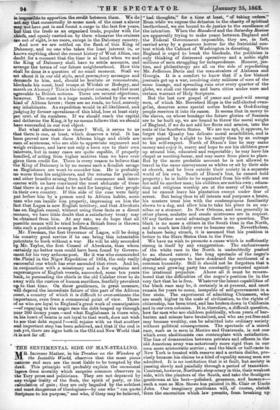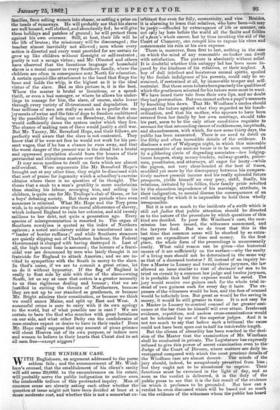THE SENTIMENTAL SIDE OF MAN-STEALING.
MR. Increase Mather, in his Treatise on the Wonders of the Invisible World, observes that the most pious nations and men are the most liable to be tempted by the devil. This principle will probably explain the occasional lapses from morality which surprise common observers in the Tory press and politicians. They are not depraved by any vulgar frailty of the flesh, the spirit of party, or the calculation of gain ; they are only beguiled by the subtlest and most dangerous of theologians—by one who "can quote Scripture to his purpose," and who, if Gray may be believed, "had thoughts," for a time at least, "of taking orders." Even while we expose the delusion in the charity of spiritual brotherhood, we are bound to do justice to the excellence of the intention. When the Standard and the Saturday Review are apparently trying to make peace between England and the Federal Government impossible, they are, in fact, carried away by a generous horror for the fratricidal con- test whioli the Cabinet of Washington is directing. When England is urged to break the blockade, the politician is only thinking of distressed operatives and. a noble eight millions of men struggling for independence. Honour, jus- tice, and philanthropy are all on the side of repudiating Mr. Jefferson Davis and the man-stealers of Alabama and Georgia. It is a comfort to know that if a few blatant journals get up a war, involving sixty millions of men of the same lineage, and spreading ruin over every quarter of the globe, we shall cat throats and burn, cities under sure and certain warrant of Holy Scripture. But the last new gospel of peace and good-will among men, of which Mr. Bereeford Hope is the self-elected evan- gelist, deserves some special notice before a God-fearing people receives it into its canon. It seems that in mercy to the slaves, on whose bondage the future glories of Secessia are to be built up, we are bound to throw the moral weight of England, if we do not add her fleets and armies, into the scale of the Southern States. We are too apt, it appears, to forget that Quash), has delicate moral sensibilities, and is more pained by a slight to his vanity than by an outrage to his self-respect. North, of Dixon's line he may make money and enjoy it, marry and hope to see his children grow up around him, educated and respectable; he may have his chapel or meeting-house, and may move from place to place. But by the more probable account he is not allowed to travel in the same conveyances as whites or sit by their side at church, and he lives outside their society in a separate world of his own. South of Dixon's line, he cannot hold property ; he is liable to be separated from his wife and see her sold to-.another man; his children are not his own ; educa- tion and religious worship are at the mercy of his master, and he cannot leave his plantation except under fear of arrest. But. being thus to all intents and purposes a brute, his masters treat him with the contemptuous familiarity shown to a dog, and allow him to take his place in an om- nibus or a steamer. In New Orleans, and less generally in other places, mulatto and creole mistresses are in request. Of any further social advantage there is no question. The black is no more a citizen in. the South than in the North, and is much less likely ever to become one. Nevertheless, a balance being struck, it is assumed that his position is better in the Slave States than in the Free.
We have no. wish to promote a cause which is sufficiently strong in itself by any exaggeration. The exclusiveness of the white race in the North is undoubtedly pushed to an absurd extent ; the long spectacle of the negro's degradation appears to have deadened the sentiment of a common humanity. Still it should not be forgotten that 'a strong and growing party has constantly protested against the irrational prejudice. Above all it must be remem- bered that the difficulties of the negro's position lie in the very fact that he is free. Whatever the latent capabilities of the black race may be, it certainly is at present, and must remain for years to come, incapable of self-government in a free state. The experiment of admitting Chinamen, who are much higher in the scale of civilization, to the rights of citizenship, has been tried, and has broken down in California and in our own colonies. It is, therefore, a difficult question, how far men who are children politically, whom years of bar- barism and misuse have brutalized, and who are yet free and may become wealthy, can be admitted into ordinary society without political consequences. The spectacle of a mixed race, such as is seen in Mexico and Guatemala, is not one which even abolitionists can contemplate with satisfaction. The line of demarcation between privates and officers in the old American army was notoriously more rigid than in our own more aristocratic service ; and the black or half-caste in New York is treated with reserve and a certain dislike, pre- cisely because his claims to a kind of equality among men are admitted. It is no institution that is at fault, but society is- passing slowly and painfully through a period of transition. Contrast, however, Northern shopocracy in this, their weakest side, with the planters of the South, and take the Solid/ern gentleman at his best—polished, generous, and humai-e- such a man as Mrs. Stowe has painted in St. Clair or Uncle John. Our imaginary gentleman will, of course, shrink from the enormities which law permits, from breaking up families, from selling women into shame, or setting a price on the heads of runaways. He will probably see that his slaves are well housed, well clothed, and abundantly fed; he will give them holidays and patches of ground ; he will protect them against his own overseer. Still, at best, their life will be the life of brutes ; the missionary will-be discouraged ; the teacher almost inevitably not allowed ; men whose every action is directed and every want provided for are certain to grow up like children, without foresight or self-restraint ; purity is not a savage virtue; and Mr. Olmsted and others have observed that the licentious language of household slaves is a moral cancer in every Southern family, where the children are often in consequence sent North for education. A certain spaniel-like attachment to the hand that flings the bone and holds the whip, is the highest as it is the ideal virtue of the slave. Bad as this picture is, it is the best. Where the master is brutal or licentious, or a spend- thrift, or even a bad manager, or where he allows his under- lings to manage for him, the slave, of course, sinks lower through every variety of ill-treatment and degradation. If four millions of men are really so sunk as to prefer the en- joyments of swine and the fate of dogs to freedom embittered by the possibility of being cut on Broadway, that fact alone would sufficiently damn the system under which they live. The chance of making men of them would justify a civil war. But Mr. Yancey, Mr. Beresford Hope, and their fellows, are perfectly well aware that the slave is not contented. They know that if he were set free he would not work for his pre- sent wages, that if he has a chance he runs away, and that the worst danger of the present war is the dread lest a brutal and oppressed population should burn the houses of their patriarchal and chivalrous masters over their heads.
It may seem needless to dwell on facts which are almost self-evident. Were arguments like Mr. Beresford Hope's brought out at any other time, they might be dismissed with that sort of praise for ingenuity which a schoolboy's exercise obtains where there is no question of its thought. The thesis that a snub to a man's gentility is more unchristian than stealing his labour, scourging him, and selling his children, is quite one for kr. Trollope's club of Geese, or for a boys' debating society. But there are periods when even nonsense is criminal. What Mr. Hope and the Tory press wish, is to sophisticate away the moral abhorrence of slavery, which induced England to ruin her colonies, and add twenty millions to her debt, not quite a generation ago. Every species of misrepresentation is resorted to. The organ of Southern rowdyism is quoted as the index of Northern opinion ; a noted anti-slavery soldier is transformed into a 44 leader of border ruffians ;' and while Southern steamers are quietly slipping out of Charleston harbour, the Federal Government is charged with having destroyed it. Last of all, the high moral tone is assumed ; the horrors of a fratri- cidal war are denounced by men who lately thought it no fratricide for England to attack America ; and we are in- vited to sympathize with the South in mercy to the slave. In God's name, if we are to commit a great crime let us do it without hypocrisy. If the flag of England is really to float side by side with that of the slave-owning South, let us say at once that cotton is a greater necessity to us than righteous dealing and honour ; that we are justified in cutting the throats of Northerners, because they are not up to our standard as gentlemen, or because Mr. Bright admires their constitution, or because we think we could annex Maine, and split up East and West. A successful crime is sure to carry with it its own apology to the world, but of what possible use is cant ? We are certain to have the God who marches with great battalions on our side, and what other Deity can the confederates of man-stealers expect or desire to have in their ranks ? Does Mr. Hope really suppose that any amount of pious grimace will cheat Heaven out of its own purpose, or induce men and women to believe in their hearts that Christ died to set all men free—except niggers ?































 Previous page
Previous page